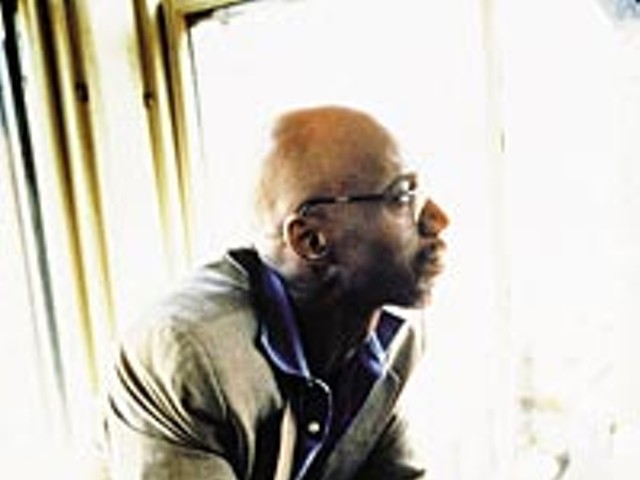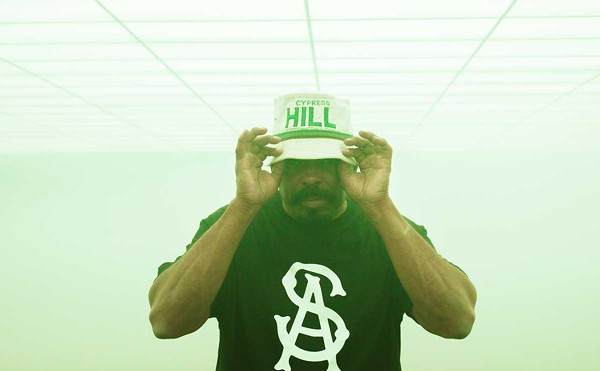Take this any way you want to take it, but Geoff Farina is too good to get famous. Pangs of irrelevant music-journo hyperbole? Try this one: Geoff Farina — an overschooled pencil-neck who sings/speaks over “jazzy” guitar chords — plays music that’s too intelligent to understand, too musical to sell and way too progressive to be popular.
Go ahead and scoff. Go ahead and mutter some contradictory grunt about head-in-the-sand elitism and turn the page to continue looking for the Suicide Machines’ show listing.
OK, who’s still with us?
Sorry to do that, but convincing the mouth-breathing “rawk” set that Farina might be something of interest is impossible. First glance shows him to be an indie elitism poster child. Here’s a guy who fronts Karate, a band that no one has heard of. Here’s a guy who writes songs that use $23 words and highbrow jazz harmonies. Here’s a guy who writes a column for an obscure magazine (Tape Op), which is concerned with modifying 1960s tube-powered amps. He’s the kind of geek that the staff at Guitar Center — dudes named “Hooch” or “Sammy” who “cut tracks” at their “killer” home studios — make jokes about. Geoff Farina isn’t in the ballpark of most people’s definitions of rock ’n’ roll.
Or is he?
“I think the reason Karate is successful is because we’re really a rock band,” Farina claims. “We’re not mixing through a million genres with songs that are like 15 or 20 minutes long with no vocals. At their core they are rock songs.”
Fair enough. Of the five Karate records that have been released over the last eight years there hasn’t been a single 20-minute wordless jam. It certainly hasn’t been all “Louie Louie” though; Farina and his compadres (drummer Gavin McCarthy and bassist Jeff Goddard) are all classically schooled at music conservatories and have carved careers of playing extremely advanced rock music. This isn’t a bunch of punks with 10-dollar six-strings, these are guys who can scrutinize the harmonic progression of Beethoven string quartets (Farina taught music theory at Boston University, for Chrissakes!)
But, to call Karate “successful” is a bit of a stretch. Yeah, guys who man indie record store counters have probably heard of them, but the band’s fan base is very much a cult thing. And, when you dig into Farina’s musical output, it’s obvious his deep knowledge of theoretical musical mechanics and relatively limited pocket of popularity might be correlated. It’s like he’s the man who knows too much.
“It definitely gets in the way sometimes because people don’t value it the way you want them to, or hope that they would,” Farina says, grudgingly bemoaning the popular shortcomings of his well-taught musical searching. “When you like a band, you have the same musical values that that band does. If your favorite band is Fugazi, you probably value strong guitars and semi-improvisational punk. And you like that whether you can articulate it or not. I think that the only thing that differentiates music fans is these kinds of values. And the weird thing about the people who are into what I’m doing, or what Karate is doing, is that they come from a vast group of values.”
Let’s step back and take a look at those values. Some are indie kids, outfitted in ringer T’s and All-Stars, who discovered Farina through his associations with the emo-core scene (as it was called). Some are audiophiles who have come to Farina through his essays in Tape Op. Some are would-be guitar gods, who understand that Farina is one of the most innovative players and songsmiths in the avant-indie rock microcosm.
But none of those niches can really contain what Farina does. With or without Karate, Farina is more than that. Take the distinctive, literate pop songwriting of Secret Stars (a side project Farina co-chairs with Jodi Buonanno, the sometimes-singer of Saturday Looks Good To Me). Take, Reverse Eclipse, Farina’s most recent solo collection. It’s just his electric guitar and his voice singing tunes that are, at the best of times, uncomfortably intimate, even (gosh!) emotional. It’s a compilation of wordy songs about broken cars, literary giants and fevered addictions, sung in his distinctive, nonchalant bleat. And he sings these to an accompaniment of complicated, overextended jazz chords that only vaguely resemble pop music.
Unclassifiable? Close, but for better or worse Farina is an unsuspecting icon of indie rock, a genre silly with half-baked musicianship and overstylized performance practices. Given his musical training and fruitful output, it’s a wonder that the bulk of his fans are probably more concerned with what T-shirts they wear than what his music sounds like.
“To me it’s important for my music to be about exploring musical ideas.” He says. And we say: Huh? “A lot of people I play with are performers who are probably based in punk forms. And it’s not like one is better than the other. If that is what you want to do or be, there is just as much art in pursuing ideas that are primarily stylistic instead of ideas that are primarily musical. I know our goals are different compared to most of the people we play with. In that way it’s an anomaly.”
And that anomaly is why writing convincing paragraphs about Farina seems so stupid. That’s why the mooks who aren’t looking for the hard-won rewards of Farina’s craft will continue to overlook him. But that’s OK too. When you look at the perverted results of who wins and who loses, Geoff Farina seems like a good secret to keep.
“It is only within this optimism that we find a knowledge that is capable of penetrating existing forms of rationality, systems that might otherwise be seen as infallible,” Farina writes in a Web-published essay on analogue recordings titled “Humans and Hardware: A History of Analog Synthesis.” Go ahead, Guitar Center company men, go ahead, non-searchers and non-believers, go ahead and laugh, but it seems like a comment with the potential for broad interpretation. “It is only in this way that we can facilitate future cultural practice and create situations from which new knowledges emerge.”
But if knowledge ain’t your thing, go ahead and laugh.
Geoff Farina will perform solo on Friday, April 9, at the Detroit Art Space (101 E. Baltimore, Detroit) with Warn Defever, Owen and Jimmy Ohio. Call 313-664-0445 for info. The show is all ages.
Nate Cavalieri is Metro Times’ wandering correspondent. E-mail [email protected]




